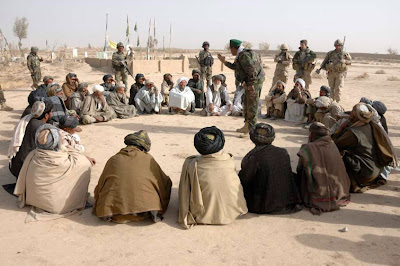AUGUST 23, 2010

The effect of bad translators on the Afghan mission is difficult to estimate -- but I believe that it's vast. Terps have a different stake from the Americans in the outcome of the war, and by definition they're working with people who can't understand half the things they say, meaning that there's no accountability if they're translating an English message into something totally different. I once asked the lieutenant colonel in charge of the Korengal Valley how many messages he thought were lost this way. I wagered that at least 40 percent of his troops' words were not getting through to Afghans. He thought it was more like 50 percent. At the time, January 2010, his soldiers were literally delivering U.S. President Barack Obama's new strategic message to Afghans. I watched them announce that the United States would soon begin withdrawal and that Afghans needed to take responsibility for their own future. If half that message were lost in translation, which half would you want it to be?
In another Restrepo scene, Captain Kearney tries to explain to a group of Korengali elders that he is not like the captain who preceded him; that he, Kearney, will do things differently, kill fewer civilians, and bring wealth and jobs and progress. He says he wants a "clean slate." That Christmas list of opportunities may or may not have been important to the Korengalis; that's a story for another time. But how did "clean slate" translate to men who remember insults for decades, in a land where grudges weave through generations? What did the terp actually say to the elders?
Whatever he told them, Kearney never won his fresh start. Before dialogue could be reset, the killing intensified, covering the slate again with blood, as Restrepo shows. American troops withdrew from the Korengal valley this spring.
Last December, I went on many foot patrols in the valleys along the Korengal as Americans traveled village to village bringing pieces of Obama's message. One day, high on a mountainside, I listened to a young lieutenant explain to a toothless elder that he needed to take a stand against the Taliban.
"You are a citizen of Afghanistan," the lieutenant said. "This nation is your responsibility." He was tense, already expecting a Taliban attack. Another lieutenant chimed in: "You need to form something like, you know, a neighborhood watch."
The terp looked at both officers, then said something to the old man, who merely stared at them. Later I asked the terp if he knew what the word "nation" meant.
"It's, it's ..." Then he shrugged and smiled and gave up. Maybe he just couldn't define it. I'm sure he had no idea what the words "neighborhood watch" meant.
I imagined this scene replicating like a virus through the countryside, through the hundreds of small units operating in the mountains, on the plains. Occasionally I asked the soldiers how they believed their messages would ever take hold. The standard answer was that it was all about "repetition, repetition, repetition." Say it enough times and the Afghans will get it. That might work. But if no one understands the words, the Americans will simply be bludgeoning the Afghans with noise.
No comments:
Post a Comment